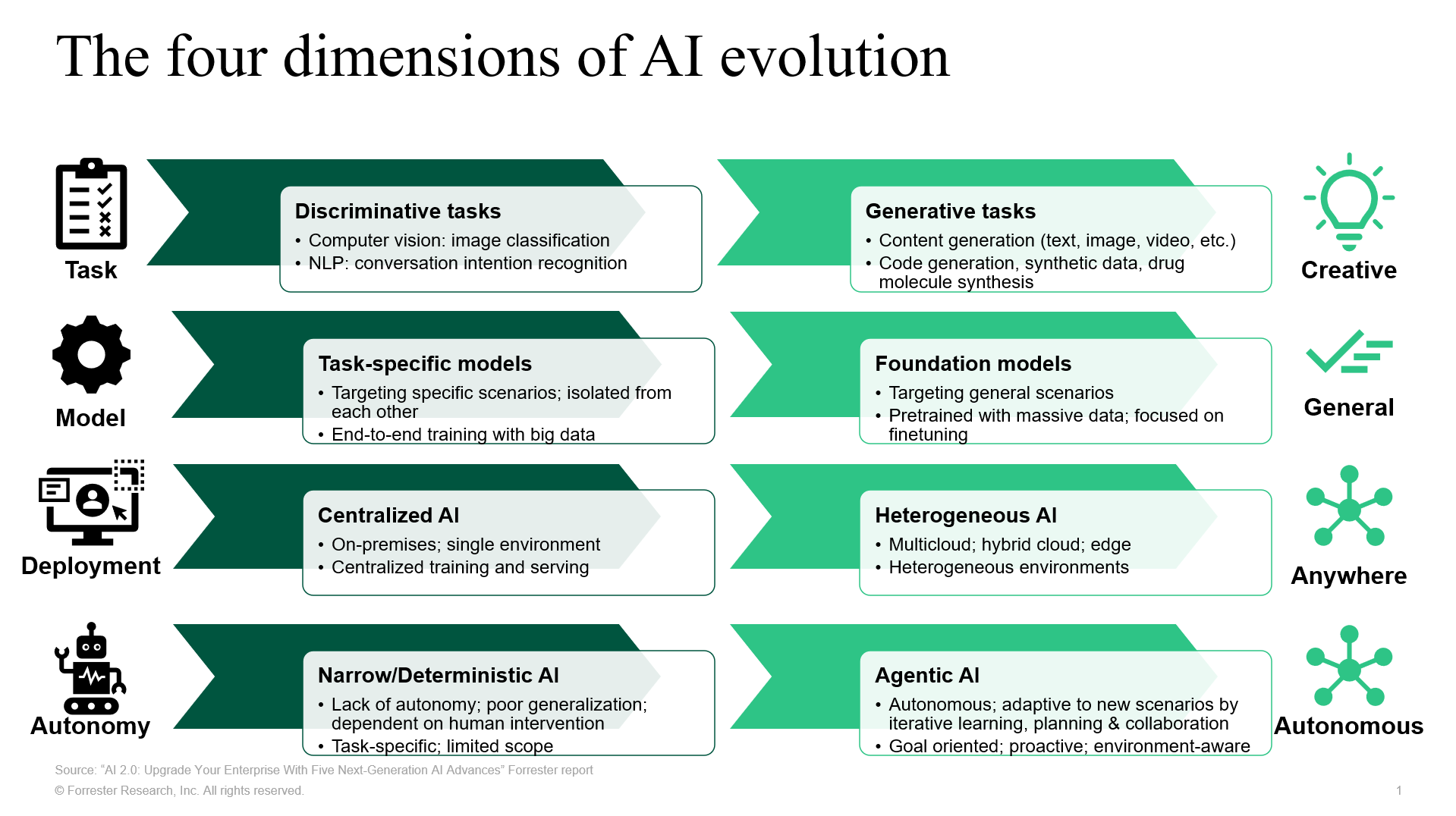Announcing Forrester’s “AI Platform” Coverage
For more than a decade, Forrester has been committed to researching AI and ML technologies and platforms. During my 13-year tenure at Forrester, I had the privilege of working alongside our talented AI analysts. Together, we have continuously refined our market definitions and research focus to stay aligned with emerging tech trends and business needs. In this blog, we introduce a new branding approach for the AI and ML platform market, ensuring our insights remain relevant and valuable for our clients.
A Decade-Long Journey In Helping Clients Innovate With AI
Here is a quick snapshot of Forrester’s coverage of AI and ML technologies and platforms:
- In 2015, we (kudos to Mike Gualtieri and Rowan Curran) pioneered Forrester’s research in the discriminative AI field named predictive analytics. This research helped enterprise clients by providing actionable insights to anticipate customer behavior and optimize decision-making to drive efficiency and revenue growth.
- In 2017, we rebranded the market as predictive analytics and machine learning in response to the rise of ML and deep learning (DL). This rebranding helped enterprise clients assess tools that also leverage advanced ML and DL techniques.
- In 2022, we expanded this definition to AI/ML platforms, reflecting a broader view of AI with ML/DL at the core. This offered our enterprise clients a broader perspective to adopt full-lifecycle AI/ML solutions, including integrating them seamlessly into their environment to drive AI innovation in business processes.
- In 2023, in the China version of AI/ML platform Forrester Wave™, we incorporated more functionalities of foundation model support to reflect the market trends of generative AI (genAI). This Chinese market research focuses on enterprise clients in China or doing business in China to harness genAI capabilities, unlocking new opportunities for content creation, automation, and personalized customer experiences.
- In 2024, in Forrester’s global AI/ML platform Landscape and Wave, we formally defined genAI as one core use case with dedicated evaluation criteria. We also emphasized AI readiness by incorporating DataOps into our framework.
- Also in 2024, we published the dedicated Landscape and Wave research on AI foundation models (FMs) for languages (AI-FML, aka large language models [LLMs]). This genAI-focused research assists enterprise clients to evaluate LLMs to help support numerous genAI use cases.
Over the past 18 months, AI technology has seen remarkable advancements. FMs have emerged as a cornerstone of modern AI, driving innovation and scalability. These models have led to breakthroughs in various domains, including model algorithms, retrieval-augmented generation (RAG), AI agents, and AI hardware infrastructure. Businesses worldwide are actively experimenting with these technologies, integrating AI into various applications to enhance efficiency and drive growth.
The Convergence Of AI/ML Platforms And FMs
The AI/ML platform and FM markets are rapidly converging through two key trends. AI/ML platform providers are expanding their FM capabilities across the entire AI development lifecycle — from data management to model development, deployment, and AI application development (particularly in agents, app generation, and agentic workflows). These platforms are also integrating with popular third-party models to better serve developers. Meanwhile, FM vendors are broadening their offerings to include comprehensive platform features like API integration, knowledge retrieval, and agent development tools. As our research shows, enterprises typically don’t rely on a single LLM but rather integrate multiple models as essential components of their broader AI infrastructure.
The convergence of AI/ML platforms and FMs signifies a profound transformation in AI adoption across four key dimensions:
- From discriminative tasks to more generative tasks. AI has transitioned from primarily performing predictive analytics to generating new content of various modalities. GenAI is being applied in various fields, such as content creation, customer service, document automation, and TuringBots. This trend highlights the growing importance of AI in augmenting human capabilities, automation, and expanding the boundaries of what machines can achieve.
- From task-specific models to FMs. Enterprise AI has evolved from specialized models requiring domain-specific training to large-scale FMs pretrained on vast datasets that can be adapted for multiple use cases through fine-tuning and prompting. These FMs function as versatile building blocks that can be customized through fine-tuning and compression techniques. Organizations can adapt these pretrained models for specific use cases without the extensive data and computational requirements of traditional training approaches. This paradigm shift has dramatically accelerated AI development cycles and optimized resource utilization, enabling rapid deployment of AI applications across diverse business contexts.
- From centralized deployment to heterogeneous architecture options. AI deployment has evolved from centralized approaches to a variety of heterogeneous options across multicloud, hybrid cloud, and edge. This shift offers architecture options to achieve the right balance of scalability, resilience, and adaptability. This allows AI platforms to operate efficiently in diverse and dynamic environments, respecting data gravity and optimizing performance and cost. This trend is particularly important for applications that require real-time processing and low-latency responses, such as autonomous vehicles and IoT edge workloads.
- From tightly prescribed behavior to greater autonomy and self-improvement. AI systems are moving from predetermined scenarios that rely heavily on human design and planning, to more autonomous approaches. With sufficient intelligence, AI agents have the potential to adapt to new scenarios through iterative learning, planning, and collaboration, making them goal-oriented, proactive, and environment-aware. This autonomy allows AI to handle complex and dynamic tasks with greater efficiency and effectiveness, reducing the need for constant human oversight. The development of autonomous AI is paving the way for advanced applications in robotics, healthcare, and other fields where adaptability and decision-making are crucial.

Rebranding The Market To “AI Platform”
As a result of this convergence, starting from this year we will fold in the AI-FML into this larger platform and further evolve our market terminology into “AI platform.” We will continuously refine our research around business use cases, key functionalities, and evaluation criteria design, aiming to help our enterprise clients in refactoring or redefining your technology strategies in AI adoption. For more details, or if you would like to share your thoughts on this, please book an inquiry or guidance session with us to discuss.
